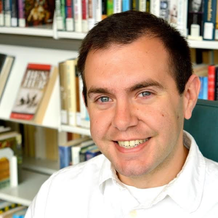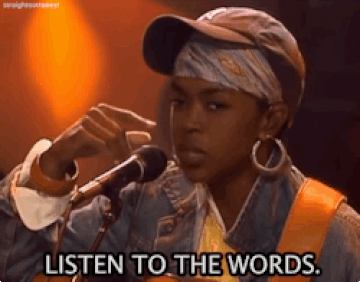|
This month's focus on spiritual practices is Dwelling in the Word. Dwelling in the word is a spiritual practice developed by Dr. Patrick Keiffert and Pat Taylor Ellison. It is a way of reading scripture that intentionally focuses people on listening to each other and discerning what God is up to amongst us. It does not seek to provide answers that arise or historical insight about the text. There is no correct thoughts or right answers but welcomes all thoughts and experiences as equal. It asks us to be present in the moment, aware of our thoughts, patient with others, and listen deeply to the spirit. Welcoming and Discerning the Spirit Dwelling in the word welcomes the spirit to breathe among those gathered and opens our imagination to what is being stirred. Keiffert states, ‘The Spirit uses whatever space we give to create an environment of spiritual discernment." Bishop Mark Beckwith briefly talks about the spiritual practice and how it opens us up to conversations with others and deepens our relationship with God. He believes it helps us ask more questions about life and the purpose we have individually and collectively. Please take a quick listen before we describe more thoroughly how to use the spiritual practice. How to Dwell in the Word There are many different versions and ways to Dwell in the Word but all of them have the same focus of openness and allowing the spirit to be present. 1. Welcome the Spirit - Ask the spirit to be present with them through prayer, silence, or another way. 2. Read a Scripture - Have someone read the selected scripture aloud for the group. Sometimes two people will read the scripture with silence in between allowing more time for people to become familiar with the text. 3. Sit Silently and Reflect - Ask yourself 1). What captured your attention and/ or imagination? A word or phrase that jumps out. 2). What would you like to find out more about? 4. Share with a Partner - Find a partner in the group you can share your thoughts with about the scripture passage and what stood out to you about the questions above. 5. Share with the Group - Have people report out as comfortable what they learned from their partners with the larger group. This might be what was felt, thought, and experienced during the reading. 6. Wrestle Together - Take time as a group to discuss what God might be up to in this passage. Are there any key themes that stand out for the group and how does that impact the group today? Why Dwell In The Word If you have been bored with reading scripture or have no idea where to start, this might be a great starting spot. I believe this spiritual practice makes the text come alive for this day and age. Dwelling in the Word is spiritual practice that allows for openness in discussion and experience, thoughtful engagement with the text and a welcoming of the spirit in our lives. Another aspect I like is that it develops community and deepens relationships when practiced with others. When we invite the Holy Spirit to be present among a group of individuals our response as a group can be powerful. So go out there and Dwell in the Word! Please follow us on Instagram or Twitter so you get notifications of our new posts. This week try dwelling in the word with a few people you feel comfortable with.
0 Comments
First of all a big thank you to last week's Guest Blogger Williams Ottens. What great insight and information about how books can broaden our worldview and help us become more inclusive. When I was a kid, like most Community of Christ children I was asked to participate in the worship service by reading a scripture, praying, etc. I tried to get out of doing this because I was shy and disliked being in front of people. Despite my worthwhile attempts, my mother lovingly coerced me to be a participant. I would walk up to the podium, talk until my voice cracked, turn beat red, finish whatever I was saying, sit down, and say to myself and my mother "I'm never doing that again." As you can probably gather, each time was never the last time. However I remember my mother softly praising me after every attempt, putting that little question in my mind "Did I really do ok?" My mother knew that skills and talents are things which are developed. You may not naturally have it but through time and effort skills arise. She seemed to understand the importance of doing things which make us uncomfortable and pushing through the fear that holds us captive. Over many years, my mindset about being in front of others has changed in thanks to the continued experiences I had. We all have natural gifts and talents. Some we know about and others are yet to be discovered. The environments around us play a major role in how we develop our gifts. Churches can play a positive role in gift and skill development however I know for many the church environment has not been a supporting place for this to happen. In fact its been the opposite, something hurtful and counter productive. People have been rejected for trying to share their gifts while others were told they were not good enough. And for some they were never looked at to provide anything past what others already thought they could do. So let's look closer at the various parts that go into using and developing our gifts and talents. What Are My Gifts? Sometimes we do not see the talents and skills we possess. However others can and do. This point is one reason why being a part of a community of people caring about you is imperative. That community is hopefully cultivating those skills from what they notice in you and encouraging you along the way. In a church community gifts are to be used and given to God and others. Not only do you need the community to help you realize your potential but the community needs you and the skills you bring. I think its important to note that these gifts should also be used outside the walls of a church building. If you are curious what some of your strengths may be you can take this free strengths test from high 5 test. You can also read Janet Scarborough Civitelli's article "Strengths Assessment: 10 Ways to Know What You Are Good at Doing." All Are Called The Community of Christ has an enduring principle that All Are Called. This is a belief that everyone is given gifts and talents that can be used to share the peace of Christ in the world. You do not have to be a minister or even church member to use your gifts to provide service. I believe this principle is one reason why so many Community of Christ congregations are led by lay ministers (bi-vocational ministers). It's a belief that everyones gifts are important and should be used to help the church function. It also means Community of Christ congregations seek active participation from its members as they are comfortable. From a skill development standpoint this can be great because it allows us as disciples to actively develop and refine our gifts with encouraging people around us. On the other hand it can cause added stress as we are pushed outside our comfort zone. Bottom line is we each have to decide what we are going to do with the gifts God has given us and the ways in which we can develop them. Rejected! I know some churches only use the best of the best. I get it, they want to create an atmosphere that will pull people into their inner selfs and connect them at a deeper level with the divine. But I also see this leaving a large majority of people to be observers, that are not cultivating their gifts. The debate will continue about what is better for those coming to church. And truly I don't know if there is a right answer but just different expressions based on what people need. I do believe the spirit moves not just based on our talents and how good we are but when we give of ourselves in the moment. If you are a person who has been rejected or pushed out I sincerely hope at some point you find your way back to sharing your gifts in a church community. It can be difficult to risk sharing again. It can be a long process in figuring out what the next steps are. Take your time and find what is right for you. Giftedness and What Really Matters? What really matters is your continued development of gifts to be used in positive ways throughout the world. I believe God sees you in this very moment. I believe God delights in who you are and sees the hidden talent that is waiting to emerge if only you believe in yourself. I believe people are waiting to benefit from your gifts if only you step outside your comfort zone. So don't hesitate but be willing to give of yourself to your community and/or religious organization. Bring positivity, bring joy, and bring the peace of Christ to others. Thank you again for all those following along! This week explore your giftedness by asking someone close to you to identify 5 strengths/ things you are good at.
 Meet William Ottens our guest blogger this week! William is the Cataloging and Collection Development Coordinator for the Lawrence Public Library. William is also the author and creator behind the blog Librarian Problems which uses GIF's to humorously identify the funny problems Librarians encounter in their profession. We are super excited to have him share his thoughts this week. You can follow William on Twitter @williamottens “Reading is an exercise in empathy; an exercise in walking in someone else’s shoes for a while.” - Malorie Blackman My junior year at Graceland University, I took an author study course on Toni Morrison, led by Professor Emeritus Dr. Barbara Hiles Mesle. It quickly became one of my favorite classes I’d ever taken. There were no more than fifteen students, and we were tasked with reading and discussing seven of the author’s novels throughout the semester. Aside from the worksheets, tests and papers, it felt much like a book club. I also appreciated this course because it was the first time I had done an in depth reading in an experience outside of the white, anglocentric focus that typically dominates required high school lists in the United States. It opened my eyes to the value of reading books by and about people who aren’t like me and the importance of the voices of the marginalized. Toni’s first novel, "The Bluest Eye", tells the fictional story of Pecola Breedlove, a young black girl who prays for blue eyes and blonde hair. With her dark skin, curly hair, and brown eyes, she’s mocked by other children and knows she doesn’t fit in. Because Pecola, and the other children, don’t have access to dolls, books, magazines, and other media that depict people who look like her, they’ve been led to believe that beauty means whiteness. Beauty means blue eyes and blond hair. This fallacy ultimately leads to the deterioration of Pecola’s mental health. Moving Beyond the Single Story "The Bluest Eye" was written published in 1970. Beyond beauty and whiteness, the novel addresses important questions about race, class and gender in a way that an author outside of the black, female experience would never be able to do to the same effect. While society, media and the publishing industry have made some progress, there’s still a considerable lack of diversity on bestsellers lists and bookstore shelves. Though that’s not to say diverse stories aren’t out there; you just have to do some digging. In her TED Talk, "The Danger of a Single Story", author Chimanda Ngozi Adichie explains that we risk critical misunderstanding when we hear from one perspective. “The single story creates stereotypes, and the problem with stereotypes is not that they are untrue, but that they are incomplete.” So how do you move beyond the single story? How do you read outside of your comfort zone? How do you find books written by diverse authors? As I’m a librarian, that answer comes easily for me: your local library. Whether you live in an urban area or a small town, your public library should be able to provide you access to books (and other media) written from a number of different perspectives and experiences. They might even be able to curate a list for you. Enduring Principle: Worth of All People The Community of Christ upholds the enduring principle that “God views all people as having inestimable and equal worth.” It’s easy to claim this, but how do you exemplify this in your day to day lives? How could you uphold this through your reading practices? Humans are creatures of habit, and we naturally stick to what we know and with which we are comfortable. Even if we aren’t intentionally exclusive, we gravitate toward the familiar because of that internal bias. As I look back at my own reading list, I see that, even with my job and the world’s resources at my fingertips, I’m guilty of this. It’s not wrong to read what you like, but if you limit yourself to one perspective, how can you learn about and appreciate others? How can you fully know that those who don’t look like you, those who don’t believe the same things you do, those who come from different places, have worth? That is the value of diversifying your bookshelf. Through listening to and learning about others’ perspectives, we can understand more fully that black lives have worth, that Indigenous lives have worth, that Muslim, LGBTQ+ and other marginalized lives have worth. And through lifting up and supporting those marginalized voices, we can demonstrate this enduring principle. I want to give a big thank you to William for sharing his wisdom and experience with us about incorporating diversity into our reading. If you have any further questions or comments shoot them our way and I will be sure to have William respond.
This week identify an interesting book written by an author from a different cultural background. Buy it, borrow it, or find it at your local library and get started! |
Please Note The views expressed here are those of the authors and do not necessarily represent or reflect the views of Community of Christ. We believe individuals should be allowed to have their own opinions and be at different places in their faith journey.
Categories
All
Archives
June 2021
|
|
Emporia Ministry
c/o Midlands Mission Center 7615 North Platte Purchase Drive Kansas City, Missouri 64118 Phone: (816) 221-4450 |
Copyright Midlands Mission Center 2024
|
International Headquarters
Community of Christ 1001 West Walnut Independence, Missouri 64050 Phone: (816) 833–1000 or (800) 825–2806 |



 RSS Feed
RSS Feed
